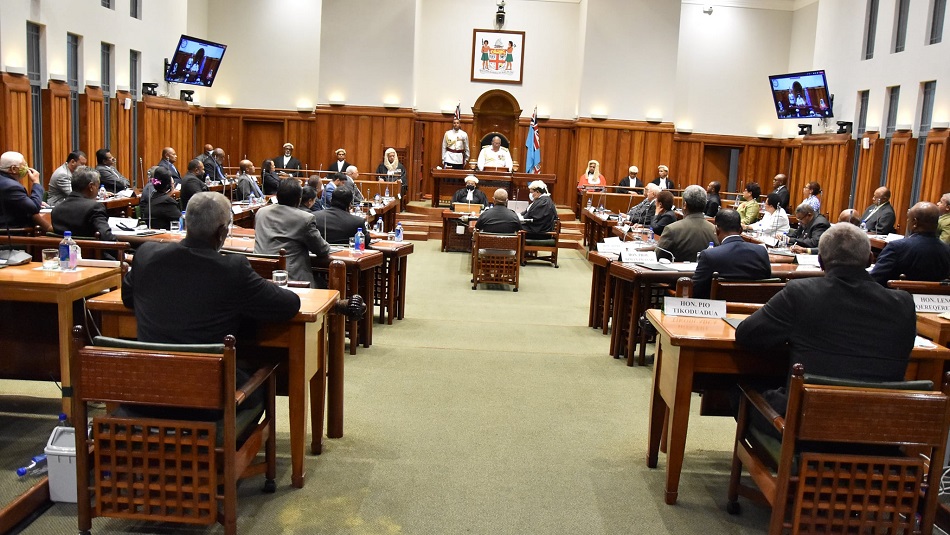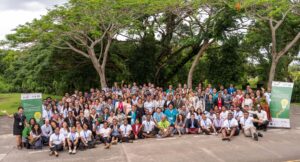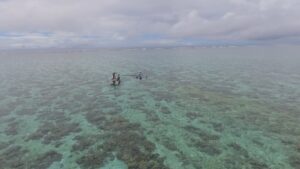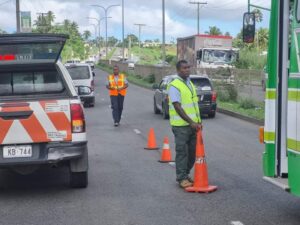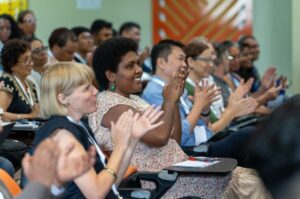Fiji’s President Ratu Wiliame Katonivere urged for unity and cooperation, calling on MPs to put their differences aside and focus on serving the best interests of all Fijians against urgent threats including coronavirus and climate change as the country readies for the 2022 General Elections.
” I know you represent different parties and may have different priorities. Regardless, you must strive to serve the national interest; the best interests of all Fijians –– all women, men, and children, and those yet to be born,” Ratu Wiliame said in his address as he opens the 2021-22 parliamentary session in Suva today.
He spoke about the need to achieve 100 per cent full vaccination status, shared his personal experiences contending with the impacts of climate change at his home village in Naduri, Macuata in Fiji’s second largest island Vanua Levu, and called on tourism operators to offer competitive packages for tourists. As Fiji draws closer to the 2022 General Election, Ratu Wiliame also reminded MPs and aspiring politicians that their entry to the political arena, or to the August House should not be founded on personal gains or pay check, or for the benefit of a single group, but for all Fijians.
“This is not the 1900s. We are not some far-flung colony in the furthest reaches of a sprawling Empire. Nor are we some backwater port in a vast Pacific. Our nation is home to a people who want stability and prosperity and who are wiser and more educated than ever before. Fiji’s global star is rising, our modernising economy sits at the cusp of recovery, and the old style of politics has no place in this new Fiji,” Ratu Wiliame said.
“We should not suffer the politics of pettiness and personalisation or exist in some perpetual state of political antagonism. Instead, we must see further than short-term political wins toward a long-term vision for the nation’s progress. And each of you must strive to move beyond a perspective that is tethered to the past, or to a single religion, a single gender, a single ethnicity, or a single province because I assure you, the future does not wait for a single one of you. And we do not have a single day to spare in meeting this century’s challenges and opportunities.
“This next national election should not become a battle of dividers, of people who pit province against province, religion against religion, or ethnicity against ethnicity. We should not only ignore candidates and party leaders who engage in that sort of politicking, but condemn them, loudly and together. Voters deserve better.”
He also laid out his priorities, one of which is “the preservation and the strengthening of our democratic society.”
“Honourable Members, with due respect, know that I will protect the flame of our young democracy from any and all who seek to extinguish it, for personal or political purposes,” Ratu Wiliame said.
“And I will use my leadership to support the highest possible functioning of the State and the work of the Executive to realise the objectives of our Constitution. We have far too much left to achieve to let sideshows dominate our national discourse.”
Ratu Wiliame also thanked his predecessor Major-General Jioji Konrote “not only for setting such a high standard of leadership as our President, but for all of the decades of service you have given to the pursuit of peace among people.”
Here is the full text of the Ratu Wiliame’s speech:
My fellow Fijians
Bula Vinaka, Miau sa bula re and good morning! It is my privilege to open the 2021-2022 session of Parliament. I thank the members of Parliament for their vote of confidence in me to assume this high office.
And to my immediate predecessor, His Excellency Major-General Jioji Konusi Konrote –– thank you, Sir, not only for setting such a high standard of leadership as our President, but for all of the decades of service you have given to the pursuit of peace among people.
My fellow Fijians, the democracy created under our Fijian Constitution will wither with our complacency but comes alive with the public’s participation, as does its values and principles. So, wherever you are watching, listening to, or reading this address, I thank you for your participation in the vital national business of our democracy.
As the youngest President of Fiji, I may not have the same number of years in public life under my belt as some of you Honourable Members. But I have been in leadership long enough to see the difference between the genuine democracy we share today and past systems that fell short of delivering true equality for our people.
I view the preservation and the strengthening of our democratic society as my greatest responsibility as your President. Honourable Members, with due respect, know that I will protect the flame of our young democracy from any and all who seek to extinguish it, for personal or political purposes. And I will use my leadership to support the highest possible functioning of the State and the work of the Executive to realise the objectives of our Constitution. We have far too much left to achieve to let sideshows dominate our national discourse.
We must see the forest for the trees, for politicians and personalities come and go, but our institutions and the ethos of equality and a strong nation state, must endure. Indeed, they must thrive.
As a Fijian who has watched these proceedings closely for years, let me offer some perspective from the outside looking in. I know you represent different parties and may have different priorities. Regardless, you must strive to serve the national interest; the best interests of all Fijians –– all women, men, and children, and those yet to be born. This is not the 1900s. We are not some far-flung colony in the furthest reaches of a sprawling Empire. Nor are we some backwater port in a vast Pacific. Our nation is home to a people who want stability and prosperity and who are wiser and more educated than ever before. Fiji’s global star is rising, our modernising economy sits at the cusp of recovery, and the old style of politics has no place in this new Fiji.
We should not suffer the politics of pettiness and personalisation or exist in some perpetual state of political antagonism. Instead, we must see further than short-term political wins toward a longterm vision for the nation’s progress. And each of you must strive to move beyond a perspective that is tethered to the past, or to a single religion, a single gender, a single ethnicity, or a single province because I assure you, the future does not wait for a single one of you. And we do not have a single day to spare in meeting this century’s challenges and opportunities.
Vaccination
After two full years of weathering the pandemic, I commend the nation on the success of the vaccination effort that has revealed a light at the end of this tunnel. Rather than cede the day to ignorance, we have come together in a spirit of knowledge, patriotism, and progress to fully vaccinate over 90 percent of adults.
I am proud, but I am not satisfied. I share our Hon Prime Minister’s ambition to vaccinate every eligible adult in Fiji and I urge the small fringe groups of the unvaccinated to accept this powerful protection against a deadly disease.
It took political wisdom and diplomatic acumen to secure these vaccines, it took administrative will to incentivise their use, it took sacrifice from our front liners to deploy them quickly and good sense from our people to embrace them. And it took a caring and compassionate government to pay out unemployment benefits –– not in the tens of millions –– but in the hundreds of millions of dollars throughout this crisis; the most assistance ever paid to Fijians at any time in our history.
Now, our long and unrelenting effort against the virus is winning us back our freedom—a freedom we must now nurture and strengthen. We have paved the way to a new normalcy, now we must walk towards it together and resume Fiji’s service as the hub of tourism, finance, communications, business, and transportation for our Blue Pacific. We cannot be complacent on the path of progress. We must seize this chance to free our economy from the grip of the virus and fuel its full recovery.
Climate Change Experience
And we must keep our sights focussed on the greatest challenge that is before us and which lies ahead of us –– that of climate change. I have seen over the course of my life what the climate and oceans crisis is causing in Fiji. In my village of Naduri my home sits 20 metres from the shore. I have seen piles of bleached coral become mountains on the beaches.
And I have watched those same beaches –– as well as homes –– disappear beneath a rising sea. I have watched coastal watersheds and crab-hunting grounds
become permanently covered in ocean. I have watched fishermen travel further and further to catch smaller and smaller fish to feed their families and earn their livelihoods. I have watched cane grower’s crops succumb to drought conditions. And I have seen arable land inundated by seawater and ruined for farming.
I’ve not only seen it all –– I’ve lived it all. As a fishermen, as a farmer, and as a father and grandfather. And I know from what I’ve also seen around the world that this is a global crisis –– a shared trauma for children on both sides of the equator –– that can only be addressed through global solutions.
COP26
I welcome back the Honourable Prime Minister, the Honourable Attorney-General and Minister responsible for climate change and the Fijian delegation from the 26th Conference of the Parties –– COP26 –– in Glasgow, Scotland. I was in Bonn during Fiji’s presidency of COP23. I know from experience that these two short weeks’ negotiations determine decades of climate action or inaction. In fact, I was scheduled to fly to Glasgow for this COP, but my election to this office demanded I remain in Fiji.
Hon Prime Minister, I wished to have been with you. It is appalling to learn that our small Pacific delegation of negotiators was outnumbered by representatives from fossil-fuel companies –– the industry most responsible for the climate crisis –– by a factor of 12 to 1. That means that for every Pacific negotiator fighting for our future, there were 12 corporate representatives fighting to sabotage it. If only we could have sent an army of Pacific people with you to COP26.
They could have filled the halls of those negotiations and carried your message to the world –– that is what we need, more of our voices –– Fijian voices, Pacific voices –– in these global negotiations, not fewer. And I thank you for speaking and working so passionately in support of this cause and in support of our national security.
I worry that some of us do not appreciate the threat this crisis poses or the vehemency of the opposition Fiji faces on the world stage. I worry that some –– blinded by political ambition and machinations –– have lost sight of what is happening at the grassroots due to climate change. I fear they are blind to the forces of industry and to some of the high emitting nations who wilfully ignore the Fijians and countless others suffering on the front line. I urge these doubters to look objectively at what the UNFCCC process and the Paris Agreement entail and how these negotiations function. Any sensible mind will see exactly why we must amplify Pacific voices within it.
But if you won’t look there, look around you. Look at our communities and see what this crisis is costing us. I assure you that cyclones, rising seas, erratic weather patterns, and dying reefs here in Fiji do not play politics. So, before you choose to attack our climate leaders and politicise an issue of such importance, please, pause and think of the suffering that climate devastation has caused in Fiji and across the globe. More importantly, think about what it will cost us –– what it will cost our children, grandchildren, and all those Fijians yet to be born. Their future is worth fighting for.
And you cannot claim to stand with those future generations or our people on the front line of the climate catastrophe if you do not stand behind Fiji’s climate leadership. And need I remind us The real work does not only happen in conference rooms. The real work is not only written on paper in pacts or agreements.
The real work also happens at home –– and that is where the government is leading most of all. I know because I’ve seen that work and because I have been privileged at times to be part of it. And because of it, amid the tragedy of the climate crisis, I have seen hope. I have seen solutions come from nature. I have seen solutions come from new technology and innovative practices. I have seen the wisdom of past generations being applied to these modern times and set us towards more sustainable living.
In partnership with government, we legally recognised the sustainable management of the Great Sea Reef that falls under Macuata Province’s stewardship –– formalising measures I had long sought to put in place to protect local biodiversity.
We have seen hope in world-leading legislation. We brought a Climate Change Act to the world at COP26 that legislates the same commitments we are asking of all nations. Because we don’t only seek a more hopeful future from others –– we create it for ourselves. We have banned single use plastics and Styrofoam. And we have successfully prosecuted developers who devastated our beautiful reefs and mangroves in Malolo –– building a powerful wall of legal precedent to protect our ecosystems.
We have seen hope in government’s effort to build the resilience of infrastructure and of entire communities and, move others to higher ground, and adopt clean energy, like solar. And we have seen how our disaster readiness has improved to offer advance warning of storms that save lives.
And we saw hope in Glasgow during the climate negotiations –– hope that Fiji helped deliver. I was proud that our Hon Prime Minister was one of the very few leaders in the world to speak openly and consistently against coal and other fossil fuels at COP26 –– and that the final outcome, the Glasgow Climate Pact, included the need to phase down coal and phase out fossil fuel subsidies. It was one of many markers of success of COP26 owed in part to Fijian leadership.
The pool of finance we need globally to develop clean energy and adapt communities in climate vulnerable countries was doubled. And the finance that has been pledged by developed nations will be carefully monitored to ensure that it is actually delivered. Over 100 countries signed on to reduce methane emissions –– the single most damaging greenhouse gas.
A dialogue process between parties was established to discuss an arrangement to address loss and damage as a result of climate change –– a matter that must be fine-tuned at COP27. And nations agreed rules on carbon-offset markets, which the last two COPs tried and failed to finalise. For Fiji, that is a big win –– and I urge members of landowning units to work with the Climate Change Division to identify how carbon trading can produce sustainable livelihoods and income by simply
keeping trees in the ground, planting more, and adopting proper forest management practices.
But perhaps our proudest achievement is that, at long last, oceans have a home in the climate negotiations. The Ocean Pathway was a fragile idea that voyaged from our islands to the world through Fiji’s Presidency of the climate negotiations in 2017. Now, the ocean-climate nexus forms the basis of global ocean climate governance –– opening a vast new sea of possibilities for Fiji and our 1.3 million square kilometres of Blue Pacific.
It is the most significant global development on oceans in years, and the timing could not better for Fiji as we lay the foundation for a sustainable economic recovery –– a blue and green recovery that preserves Fiji as a frontier of well-managed and pristine natural beauty. I want to speak for a moment on that recovery –– particularly the rebound of our tourism sector –– because of the profound importance it bears to so many families.
Because our national carrier weathered this COVID storm with the support of government and financiers, it is ready to fly visitors to our shores from 1 December. As those tourists arrive, we must remain as COVID-safe as possible and unite employers, employees and government behind a sustainable comeback for the industry.
Tourism Recovery
The recovery of our tourism sector and of our economy won’t be measured in months, but in years.
But it will not happen at all if we get greedy and try to sprint our way to recovery by hiking up
prices in our hotels and restaurants. That short-sightedness will scare tourists away to other,
attractively-priced destinations that are offering vacation deals of a lifetime. Fiji’s brand must
stand out in this highly competitive sector.
Government has empowered our hoteliers and tour operators to do so with practical incentives, reduced duties, and attractive tourism packages so that
we can be price sharp, COVID safe and capture a big share of the market. The next several months
should not be focussed on short-term margins but on long term market share so that our people not
only get their jobs back, but keep them. And to build on this economic momentum, businesses and
individuals should seize this opportunity for investment and commence now with the constructions
of homes, apartments, warehouses, shops, and factories to take advantage of our economic
recovery and help diversify our economic base.
Bills to be considered
And to support our march towards a modern and caring Fiji, the government will put forward the
following bills for consideration in this legislative session:
Child Care and Protection Bill
Child Justice Bill
Fijian Competition and Consumer Commission (Amendment) Bill
Landlord and Tenant Bill
Investment Fiji Bill
Water and Sewerage Services Bill
Architects Bill
Terrorism (Suppression of Financing) Bill
Civil Aviation Bill
Civil Aviation Accident Investigation Bill
Civil Aviation (Security) (Amendment) Bill
Statistics (Amendment) Bill
Corrections (Amendment) Bill
Search and Rescue Bill;
International Mediation Bill
Industrial Hemp Bill; and
The Development of Informal Settlements Bill.
2022 General Elections
Honourable Members, our third genuine election of equal votes of equal value may occur during this legislative calendar.
This next national election should not become a battle of dividers, of people who pit province against province, religion against religion, or ethnicity against ethnicity. We should not only ignore candidates and party leaders who engage in that sort of politicking, but condemn them, loudly and together. Voters deserve better.
Elections are their opportunity to choose who is best to lead them –– who has the sound philosophy and policies that create stability, that build confidence, and ensure equal treatment and equal opportunity as provided for in our Fijian Constitution. And every Fijian voter must understand clearly and specifically what vision different parties represent, what ideas and plans they bring to the table, and how they plan to finance their socioeconomic policies and legislative ambition.
Those who seek office must approach the campaign with compassion, with dignity and understanding, and they must “stay high” by adhering to principles of ethical conduct rather than “go low” by seeking votes at any cost. Merit must matter in our elections, just as it does across our civil service and for the Boards that govern our companies.
I have personally served on a number of boards, including Tropik Wood, Fiji Pine, Fiji Airports, FSC, Fiji Coconut Millers, and Fiji Rice where I have been privileged to work alongside well qualified, merit-appointed colleagues. I cannot stress how impactful merit-based leadership can be in steering our industries toward success, better jobs and greater prosperity.
Without merit-based selection, our companies, our civil service, and even our government would serve the interests of a privileged few rather than serve the Fijian people as prudently managed, sustainably profitable, and service-delivery-centric organisations.
Honourable members, do not forget that these are still the defining years of our new Fijian democracy. The eyes of the nation and the world are upon us now, as will be the eyes of coming generations who will learn from the precedent we set. We have much work before us. And your effort to address the challenges of the day must be embodied in legislation, debate and discussion that empowers all Fijians through visionary leadership.
As we open this session of Parliament, each of you must answer the questions: are you a partisan or are you stateswoman or statesman? Are you here to better the lives of all people, or are you here because you see politics as a means to a pay check or a way to gain power or status? Words can’t tell us the answer to those challenges –– only your actions can show us.
Honourable Members, political life in a nascent democracy likes ours should not be seen as career, it must be a calling; one suited only to those who aim to serve the nation with dignity, decorum, poise and a consistent national focus. The people look to you for that, and they depend on your foresight to understand what we can achieve together. Do not fail them.’
As I conclude Honourable members, I beg your indulgence.
Tui Macuata
To the people of Macuata, my people, the Vanua of Caumatalevu; you have been part of my journey and I believe it is only appropriate to acknowledge and thank you all. Although I am the Head of State I will continue to serve you as the Tui Macuata. May Almighty God Bless you all. May God Bless Fiji. Vinaka vakalevu. Thank you.
Photo: Fiji Parliament Media

